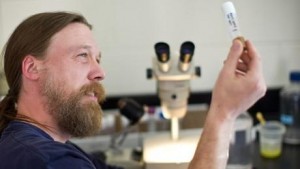 New findings suggest that a group of hormone-producing cells in the brain can actually control blood sugar levels. This new finding could result in both a diabetes treatment and a weight loss drug.
New findings suggest that a group of hormone-producing cells in the brain can actually control blood sugar levels. This new finding could result in both a diabetes treatment and a weight loss drug.
Typically, in fruit flies both starvation and reduced diet will lead to hyperactivity. When a fly is hungry, they buzz around with intense aggravation, trying to find more food. This happens due to enzyme, which is called AMP-activated kinase. This enzyme stimulates the secretion of the adipokinetic hormone, which is similar to glucagon. This hormone acts differently than insulin, it acts like an opposite. It tells the body when to release sugar or food that is needed for hyperactivity. The body will use up its energy stores until it finds food.
Associate professor of biology Erik Johnson and his research team at Wake Forest University turned off the AMP-activated kinase, the cells the decreased the sugar release and the hyperactivity response stopped nearly completely. Even when the fruit flies where facing starvation.
Johnson said, “Since fruit flies and humans share 30 percent of the same genes and our brains are essentially wired the same way, it suggests that this discovery could inform metabolic research in general and diabetes research specifically. The basic biophysical, biochemical makeup is the same. The difference in complexity is in the number of cells. Why flies are so simple is that they have approximately 100,000 neurons versus the approximately 11 billion in humans.”
Due to the findings of this investigation, neat future medical advances could take place.
One of those medical advances is in diabetes research. The adipokinetic hormone in an insect is similar to the hormone glucagon found in humans. Glucagon raises the blood sugar levels and insulin reduces them. In humans, it is very hard to study the glucagon system because the pancreatic cells are hard to pull apart. By studying the fruit flies remarkable similar hormone, a cure for diabetes could be just around the corner.
Another medical advancement is in weight loss.
Johnson said, “Exercise stimulates AMP-activated kinase, so manipulation of this molecule may lead to getting the benefits of exercise without exercising. When you turn off AMP-activated kinase, you get fruit flies that eat a lot more than normal flies, move around a lot less, and end up fatter.”